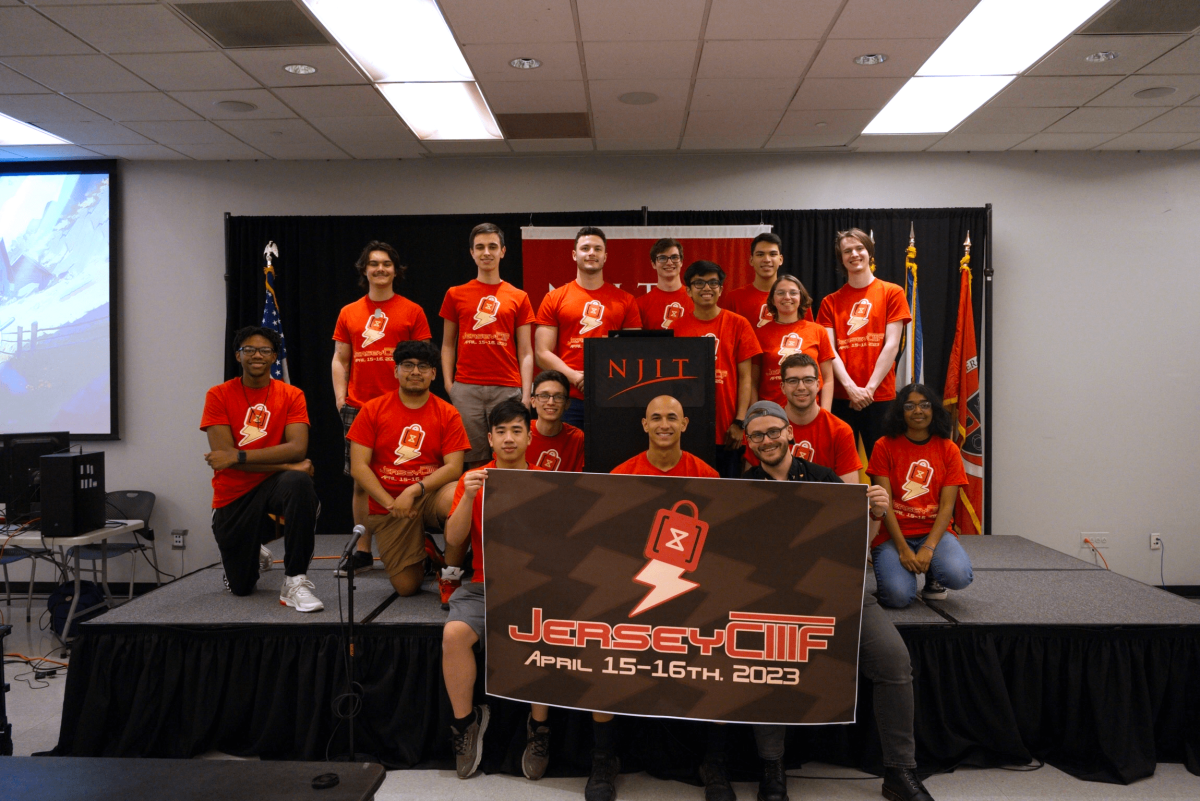“With over 1400 users, [there are] 730 teams from Australia, India, Brazil, South Korea, Ukraine, Italy, France, Germany, South Africa, Kenya — on and on the list goes. This is a worldwide event hosted by NJIT, and it’s all about the future,” said television host John Elliott for CBS News New York’s live reporting on the weekend of April 15-16.
The third annual JerseyCTF capture the flag competition took place on campus, hosted by NJIT’s Association for Computing Machinery (ACM), the NJIT Information and Cybersecurity Club (NICC), and the NJIT Secure Computing Initiative (SCI). There were 1,515 total registrants, with 802 active participants — which includes individuals who solved at least one challenge. 801 total teams were registered, and 481 teams actively participated.
“[JerseyCTF] connects with the industry; it connects with stakeholders. It demonstrates the kind of academic program that we have here that trained them to be competitive in this kind of a competition,” said NJIT President Dr. Teik Lim in an interview with Elliott. “We train students to think inquisitively, to have an open mind, to be innovative, and to be entrepreneurial.”
This year, there was a strong emphasis on in-person attendance, allowing participants to work with each other face-to-face. Another aspect that set the event apart from previous years is the addition of NICC as a collaborating organization. There was also accentuated teamwork when creating the challenges presented in the competition.
Three NJIT students executed the IS700B Master’s Project – JerseyCTF III Challenge Development and Event Administration. Sam Itman, Daniel Daszkiewicz, and Logan Reyes are all completing their master’s degrees in information technology administration and security in Fall 2023; JerseyCTF was their task under Dr. Cristian Borcea, Dr. Reza Curtmola, Dr. Vincent Oria, and Dr. Ali Mili — the principal investigators of the NJIT CyberCorps Scholarship For Service program.
“In the previous two iterations of JerseyCTF in 2021 and 2022, the challenges were being developed without a ton of team collaboration and research involved. It was very much individualized — we could get a challenge or two from alums, a few from ACM members, etc.,” Reyes explained. “The goal this time was to produce more sophisticated challenges across all categories, and we were successful in that because of the newly provided resources and time. The master’s project directly contributed to 17 additional challenges for the competition.”
His favorite part, as a Tech Lead, was “working alongside the NICC, ACM, and SCI teams in our ‘Mission Control’ corner of the Campus Center Ballroom.” The other two leads included Ethan Ho, second-year computer science major and ACM president, and Alfred Simpson, third-year information technology major and NICC president.
“One of my favorite parts of the event was the event being televised by CBS. It was great to see John Elliott drop by with his lively and uplifting personality,” Ho mentioned. “One of the benefits was the publicity made in the New York metropolitan area, hopefully increasing attendance in later years.”
Ian Hanna, third-year information technology major and NICC vice president appreciated the feedback the leading organizations received. He said, “It’s nice to know that people took time out of their day to either congratulate us or tell us how it could have gone better. It means that this event meant something enough that they wanted a change, which is really cool.”
Simpson acknowledged that the event “highlighted how diverse the industry can be and how the valuable input of different people, their majors, their backgrounds, and even their cultures can impact someone’s approach to security.” A target for next year’s JerseyCTF is marketing towards diversity organizations, as 72.3% of the participants indicated they were male.
In the student division, an NJIT-based team named The Dropped Tables came in third place. It included third-year NJIT information technology major Daniel Marriello, fourth-year NJIT information technology and computer science student Mihir Rana, fourth-year NJIT information technology major Alex Barney, and first-year University of North Carolina – Chapel Hill computer science student Amy Xu, who joined virtually.
Xu underlined how the competition doesn’t require knowledge as much as knowing how to apply skills you have. “I don’t have much knowledge in the actual technical aspects, but you can still be a contributor if you know what the tools at your disposal are capable of accomplishing,” she said.
“What I’ve learned from this experience is that I still have much more to learn in the pursuit of cybersecurity,” Rana mentioned. What he expected from participating in the event was different from his actual experience, as the academic foundation was not as relevant as applying skills in the capture the flag context. He nonetheless enjoyed being able to work through challenges and hurdles as a group.
It was Barney’s first time doing a capture the flag event. “All of us had gotten the solution, but we didn’t put the correct credentials into the right fields,” he commented about one of the challenges called Timeless. “It was frustrating but kind of funny when everything was said and done.”
“A highlight was solving the Discord challenge, which started off in the JerseyCTF Discord and pointed us to a wild ride to the crazy finale of artificial intelligence-generated Joe Biden reading The Scalar, [The Vector’s annual satirical edition],” Marriello said. “It truly felt to me as though the challenges were built in a way to introduce you to tools and expect you to learn about how to use them rather than expect mastery of them.”
The organizing teams are excited to see what the next year holds for JerseyCTF — they encourage anyone to suggest ideas to implement in upcoming competitions.

































